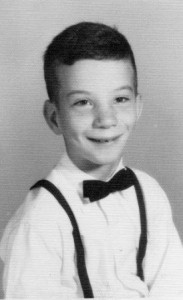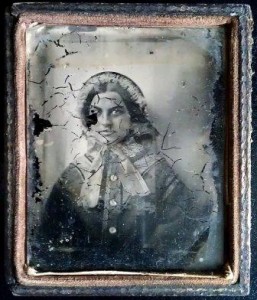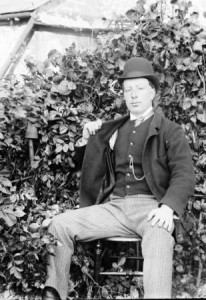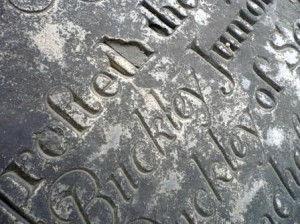All the Tour De France hoo-ha has thrown up the splendid name of Bradley Wiggins. Now a name like that conjures up the cheekiest boy in 4b to me, a dab hand with conkers and adept at pulling faces when the teacher’s not looking. He’d have sticky-out ears, a tuft of unruly hair he sticks down with spit and a good line in the dog-wrote-my-homework excuses.
What about Tempest Pollard? This wonderful name was found whilst researching a family tree. For me, she is a bold red-headed girl, a fisher lass as strong as many of the lads and quite capable of cutting anyone down to size. She’d help haul the lifeboat through winter snow and pose for Frank Meadow Sutcliffe with her local bonnet on.
But to someone else, Tempest Pollard is a solid ox of a man, a farmer with hands broad as spades and a slow burr of a voice. He’s not given to much speech, but what he says he holds to.
So how do I choose names for my characters? I could go the Dickens route and make them up – you know what you’re getting with Mr Gradgrind and Lady Honoria Dedlock. Yet although my writing has fantasy elements in it, I strive for a certain degree of authenticity.
By that I mean the names should reflect the place and time that I’ve chosen – even if they are alternatives to reality. For example, I have lots of fun researching names and occupations in early 19th Century Sussex to populate Regency Selchester. One of my best sources are old directories which you can search by decade and area here. It’s a fascinating resource/timesink.
Another entertaining, if slightly creepy, approach is to visit graveyards: I guarantee you will find at least one fascinating name. To avoid offending family sensibilities, I do tend to mix and match forenames and surnames. I also cross-check on the internet to see if my character’s name throws up anything inappropriate or offensive. So far, I’ve been fine.
Anyone who has done any ancestor hunting will know how frequently certain names turn up: Elizabeths, Marys and Margarets; Georges, Williams and Thomases run right through many a family tree. This is where accuracy needs sacrificing to art.
- You don’t want easily confused names
- You want your main characters to be memorable
I have been known to keep an alphabetical list to make sure no initial letter gets repeated – though it gets interesting with C and K, Th and F. I have learnt I have a real penchant for surnames starting with H.
So after all this, I sound terribly organised or weird depending on your point of view. But I will end on a confession: some of my favourites come out of nowhere. Both Mattie Henshaw and Clemency Atwell sprung out of my mind like Pallas Athene from the head of Zeus.
How do you choose? Do you see someone from the sound of their name?






I like the nonsense-sounding names of Mervyn Peake, but to be honest I am usually more clinical (and perhaps more cliched) in my name choices: I generally sit at my desk with a copy of “Arabic Baby Names” or “Celtic Baby Names” or “Star Names,” depending on when and where the book is set. I tend to pick names which have similar qualities and characteristics to how I want my characters to be. I use mythology a lot as well, but that’s because I use mythology as sources for many of my stories (although I’m conscious that can become fairly trite). Sometimes I just borrow words from other languages, particularly synonyms for qualities my characters have, or characteristics of place names. I name places much as I name people.
Trouble is, I’m rubbish at keeping detailed records of my names so three years pass and I try to remember if I intended a name to mean “the rainbow” or “the rain archer,” wildly different characters depending on the context. I am rubbish, I should use Scrivener.
Also, perhaps I shouldn’t confess this, but I also take a lot of names from botany. When I can’t, I find that a little working knowledge of Latin can provide infinite names for the kinds of stories I write, just as early botanists combined characteristics for plant names. Amacardia, “Loving Heart.” Astrid Audax, “Bold Star” (I can imagine a 14 year old spaceship stowaway called Astrid Audax, bet she has multicoloured hair and some exotic pet). Ossifrage, “bone-cruncher”.
But I also have a horse called Horse.
Latin names are always grammatically incorrect. They also don’t win me friends, as I’ve been sneered at by at least one reviewer for “trying to be too clever”. I wasn’t, but I may need to change my approach…
Thank you for commenting Maya – I knew I should have mentioned Peake. Also Tolkien was pretty adept – although I want to deal with place names in another post and he will feature there. Your use of Latin is inspired – and frankly if a reviewer sneers, it says far more about them than it does about you!
I love choosing names for characters. Some of the cultures described in my books even have their own bizarre naming conventions, which allows me to be thoroughly eccentric about name-selection.
In some cases I invent names, arranging collections of sounds that seem to have the right ring for the character. For others I make use of ordinary words that have a good, name-ish sound to them, like ‘erstwhile’ or ‘flotilla’.
I also draw heavily upon English place names (we seem to have the best and quirkiest village names in the world). At some point, I would like to create characters worthy of names like Crowmarsh Gifford, Clenchwarton or Winterbourne…
Glad to see you commenting again, Frances. I love your eccentric use of strange words & place names. I will be looking at the naming of topography next week I think ( unless something staggering turns up.) Ta!
Naming characters is a right larf and I can’t continue a story until I’ve got the names just right. The lesson I learned during NaNoWriMo was to name ALL your characters in advance of their appearance. With all the plotting on the fly and trying to weave twists in as you go ,it’s too easy to lose track.
Got almost to the end of my story before I found I’d called two of mine, Toni and Tony. Didn’t realise until they appeared together in a scene.
For me, the right name is essential as it suggest a particular character type so it’s worth going over as many lists as you can wherever you find them. And my other top tip: write them down in your commonplace book. You WILL forget them.
Thank you Mr Uku. Spot on advice!